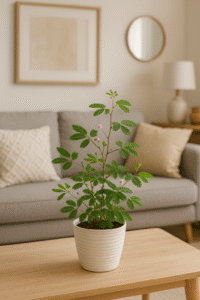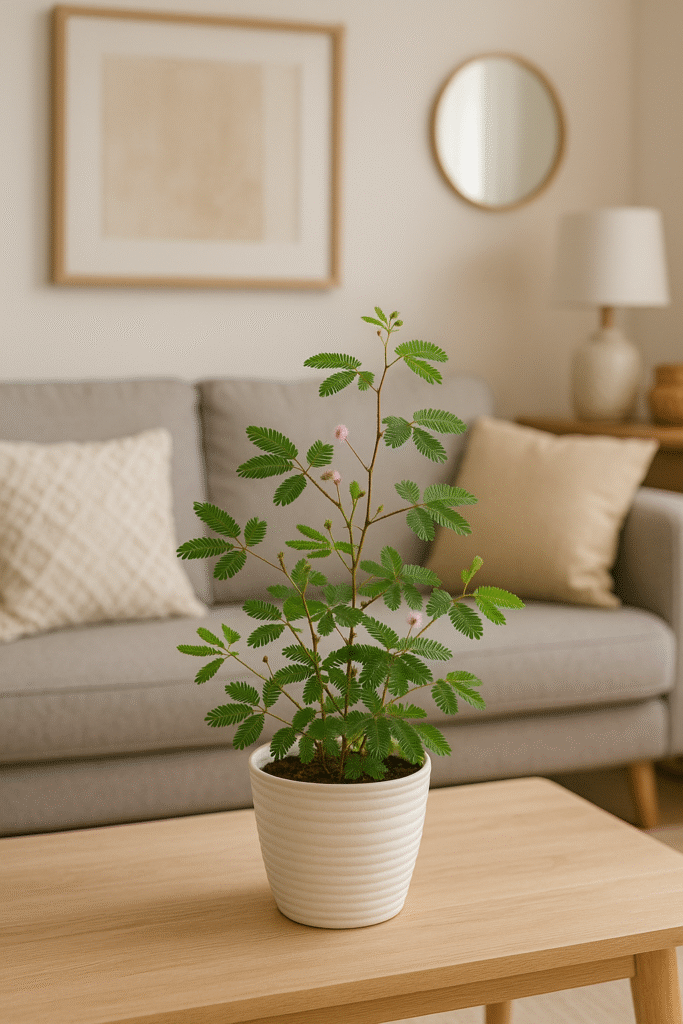The sensitive plant (Mimosa pudica), also known as touch-me-not or shameplant, is one of the most fascinating species you can grow at home or in your garden. Famous for its ability to close its leaves when touched, this small plant is more than just a curiosity. It combines beauty, ecological importance, traditional medicinal uses, and educational value, making it an exceptional choice for anyone who wants to connect with nature in a unique way.
In this article, you will learn 6 reasons to discover the sensitive plant and why it deserves a place in your home or garden.
1. A natural wonder: the movement of its leaves
The most striking reason to know the sensitive plant is its unique movement. When touched, its delicate leaves fold in just a few seconds, a phenomenon known as thigmonasty.
This reaction works as a defense mechanism, discouraging herbivores and insects from eating the plant. It can also react to wind and heat, showing how dynamic and responsive nature can be.
Children and adults alike are amazed by this feature, turning the sensitive plant into a living “showpiece” for any household.
2. Easy to grow at home
Another reason to discover the sensitive plant is how easy it is to cultivate. It adapts well to different environments and doesn’t demand complicated care.
-
Light: thrives in sunny or partially shaded areas.
-
Water: prefers moist but well-drained soil.
-
Climate: grows best in tropical and subtropical conditions.
Because it propagates easily from seeds, it can be planted both in pots and directly in the ground. For beginners in gardening, the sensitive plant is an excellent choice.
3. Traditional medicinal uses
For centuries, the sensitive plant has been used in traditional medicine in different cultures. Although not all benefits are fully proven by modern science, the plant has been studied for its bioactive compounds.
Reported uses include:
-
Calming effects, helping with anxiety and insomnia.
-
Anti-inflammatory properties, which may relieve minor aches and pains.
-
Antiseptic potential, with leaves sometimes used in poultices or herbal teas.
This highlights the sensitive plant as an example of the healing potential hidden in nature’s diversity.
4. Ecological importance and biodiversity
The sensitive plant also plays an important ecological role. Being a legume, it enriches the soil by fixing nitrogen, which benefits nearby plants and improves soil fertility.
Its pink, fluffy flowers attract bees and other pollinators, supporting biodiversity in natural ecosystems or even in a home garden. By growing the sensitive plant, you are also contributing to ecological balance.
5. Cultural and symbolic meaning
Beyond science, the sensitive plant has inspired culture and symbolism worldwide. Its leaf-closing behavior has been associated with sensitivity, modesty, and protection, qualities that resonate with human emotions.
Writers, poets, and artists often use the plant as a metaphor for delicacy and introspection, proving that its appeal goes far beyond the biological curiosity.
6. A perfect plant for learning and interaction
Finally, the sensitive plant is an outstanding educational tool. In classrooms or at home, it serves as a living demonstration of how plants interact with their environment.
Children are instantly fascinated when they touch its leaves and see them fold. This simple interaction sparks curiosity about biology, ecosystems, and the importance of respecting nature.
For gardening enthusiasts, it also provides an interactive experience that no other plant offers.
Conclusion
The sensitive plant (Mimosa pudica) is not only beautiful but also extraordinary in many ways. It is easy to grow, rich in traditional medicinal uses, ecologically valuable, culturally meaningful, and highly educational.
If you are looking for a plant that combines curiosity, functionality, and natural beauty, the sensitive plant is a perfect choice. Whether in a pot indoors or in your garden, it will always be a source of wonder.

🌱 Organize Your Plants with Style! 🌱
Get this 6-pack set of plant pots with drainage holes and saucers, perfect for indoor and outdoor plants, succulents, and houseplants.
Durable, practical, and beautifully designed in white to fit any decor.

🌿 Discover the Benefits of Ora-pro-nobis! 🌿
Learn why Ora-pro-nobis is one of the most nutritious and versatile plants you can add to your diet.
Packed with proteins, vitamins, and incredible health benefits.

